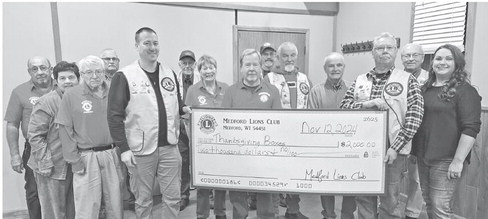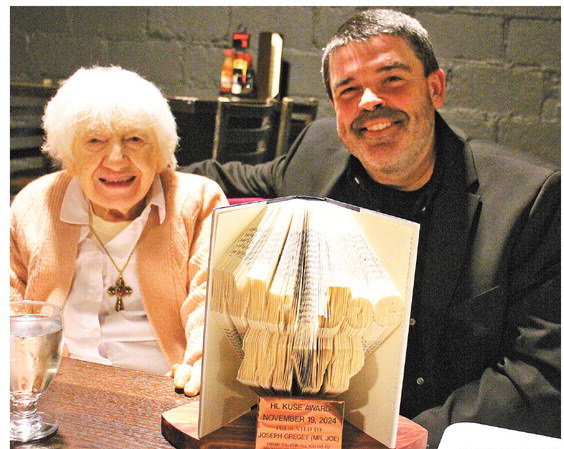District administrator Pat Sullivan said ….
District administrator Pat Sullivan said that had the referendum lost in a landslide they would not be having the discussion and would have moved on from it. However, with such a narrow difference between those in favor and those opposed, board president Dave Fleegel said they owed it to the voters to look at it again, noting that the needs that prompted the referendum are not going to go away anytime soon.
Board member Barb Knight favored bringing the same question back to the voters, suggesting that the reason it failed is that the district did not reach enough people with the information about the need for the project.
“I don’t want to go any less,” she said, noting that the board had refined the project prior to deciding on the referendum question cutting what had originally been proposed as a $55 million project to $39.9 million.
Board member Cheryl Wibben agreed and said that in particular she has heard from many people who had not seen the video the district had prepared with Findorff/PRA highlighting the needs at the high school. She said she has been told by people who voted against the referendum that after they watched the video for it, they had changed their minds and would have voted yes. She also noted that of the local voters there were 214 that had not voted at all, more than enough to impact the results.
Board member John Zuleger disagreed with presenting the same question to voters six months after they voted it down.
“The majority said no,” Zuleger said, comparing it to the presidential race between Donald Trump and Joe Biden where there was a winner and a loser. He said that people may be unhappy with the result, but it doesn’t change the fact that the referendum failed. He said he felt the district and its consultants did a fantastic job in educating the voters and said the referendum is still very much needed, however had dim hopes of voters embracing a repeat of the same question.
“If you go with the exact same thing it will fail again,” he said. The school board has until January 28 to decide on putting a referendum on the spring election ballot. He suggested delaying a decision to put a referendum question to voters until either the December board meeting or January board meeting and in the meantime have board members canvass voters, particularly in the rural areas that were most in opposition to the referendum and see what it is that they opposed. He said they could use this to decide what could be changed or removed from the project in order to make it more palatable to voters.
The spring election typically has a much lower overall voter turnout than fall partisan elections. This is particularly true in presidential election years where the turnout is much higher than in other years. With school board elections leading the ballot in the spring, the voters often have a much higher connection to the schools. In polls conducted last spring, those with direct ties to the schools were strongly in favor of the proposed projects at the high school.
“It is risky,” Fleegel said, noting that either way the district goes there is a chance that a second referendum may not pass.
Board member Steve Deml was cautious about bringing the same question to voters. He said he felt there are deeper issues than just cost.
Board member Paul Dixon was also cautious in regard to asking voters to support a referendum again right away. He said in an ideal world he would like to wait until a time when COVID is a thing of the past and that the nation had a chance to heal from the divisiveness of the past four years. “I don’t care what we put out, it has no chance of passing because we are not addressing the reason it didn’t pass in the first place,” Dixon said.
Fleegel disagreed about the impact of national politics on the referendum noting that out of 53 referendums in the state only eight of them failed, including Medford. Sullivan supported sending the referendum back to voters, saying that while some could consider it insulting to the no votes to ask voters again, he said it was equally insulting to the large number of people who voted in favor of it to not try.
Zuleger suggested that the referendum may not have passed not because it contained too much, but that it did not contain enough. He said the district had honed down the project to have the spaces be just enough rather than addressing all the needs. “Take the full deal back,” he said, referring to preliminary plans that included additional spaces.
Board member Oralee Dittrich said one concern she had was with the lack of visibility of the referendum in the community. She said while the referendum was visible on social media, there weren’t “vote yes” signs or similar things in the community that other areas have had. State law prohibits schools from spending taxpayer money to run “vote yes” campaigns and can only put out information to voters as to need.
Sullivan explained that in other places those “Vote Yes” committees are made up of parents and community members. He predicted that if the district went to referendum again that people would come forward with those committees.
Zuleger said it was important to go back to the voters before making a decision and ask them for their input. He said that if the board voted to go to referendum again before talking to voters, it would send a message that rather than asking for their opinion they are looking for their approval. “Make them part of that conversation,” Zuleger said of talking to voters.
Knight said she did not think it was very realistic to personally contact all the voters between now and the next board meeting, especially given the time of year.
Fleegel said it was important to try to contact voters and get their feedback noting that he would like residents to tell them what they like or don’t like, but said some may tell them to go fly a kite.
After more than an hour of discussion, board members voted 4-4 on a motion to move forward with sending the referendum back to voters in April with DeDe Strama absent. With a tie vote, the motion failed. Knight, Brian Hallgren, Wibben and Dittrich were in favor of sending the question back to voters as is, with Zuleger, Fleegel, Dixon and Deml opposed. Deml noted after the vote that he may feel differently next month after making an attempt to get more feedback from voters.
Student travel
Planned student trips to Ecuador and Peru for next summer are on, at least for



